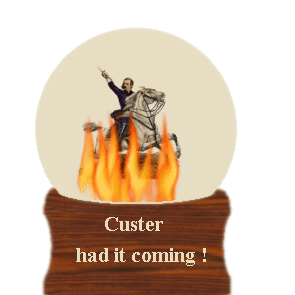Custerology: far more than the study of "Custer"
It also might explain the German fascination with Indians in general and Karl May's Winnetou in particular. And the American love of mascots and other stereotypical Indians. Note that all these people focus on the Plains Indians and the associated stereotypes: chiefs, braves, teepees, etc.
Elliot gives us a plausible explanation for this. It's one I've expressed many times also. Namely, that in celebrating Plains Indians, we also celebrate our victories over them. They were savage and fierce, wild and free, which we consider good qualities in warfare. And yet we defeated them, which proves we're even more mighty militarily.
This also explains why we build monuments to half-naked savages and not to civilized Indians such as Sequoyah, Charles Eastman, or Vine Deloria Jr. Honoring Indians for their modern achievements doesn't bolster our fragile egos. It doesn't reinforce the message that ultimately we're no. 1.
So we focus on their "primitive" achievements because they're irrelevant to us. Who cares if Indians were brave and noble? So were the ancient Greeks and Romans, but we don't make decisions based on them.
What's past is past, and the Indians eventually lost. We "honor" them like we honor American Idol losers, who also don't matter. Then we break their treaties and take their land.
If we acknowledge that Indians had viable cultures and civilizations, it would call into doubt our dubious behavior. We destroyed these cultures and civilizations because we thought ours were better. That's still our operating principle: that Western (i.e., white Christian) civilization is the pinnacle of creation.
Our entire society is built on the assumption that our values are incontrovertible. Because we think we can do no wrong, we invade other countries, heat up the climate, fill the ocean with garbage, consume vast quantities of resources, etc. Once you start questioning these values, the whole house of cards threatens to fall down.
For more on the subject, see America's Cultural Mindset.


2 comments:
Writerfella here --
The real value of George Armstrong Custer (notice: NO military rank given) is that in his time, he was the pinnacle of hopes in the Indian Wars. His much-accounted defeat is and was a 'wakeup call' for Manifest Destiny. The pause given only was momentary, however, as Custer then became a martyr in the cause of genocide; 'them damn Injuns killed our hero, so we must kill theirs!' Witness how the genocide increased after June 25, 1876. Custer's loss became a win for the United States.
writerfella held a party in Panama City, FL, on June 25, 1966, for the 90th anniversary of Custer's demise. 120 of his USAF friends attended, with beer and chips and fries (from Sandy's) and free pool games and a constant jukebox in a bar called the 77 Sunset Strip in Panama City, FL. They talked about it for months afterward, and they wanted a similar blowout on June 25 in 1967. Sadly, writerfella had to tell them it was their turn, as the next such party would occur in 1976 (the centennial), long after writerfella would have left the service. There was such a party in Los Angeles but it coincided with the premiere of SPACE: 1999 on TV, and so no one remembers just exactly why it occurred.
There now have been three more such celebrations, in 1986, 1996, and 2006. Hopefully, writerfella will be around for 2016...
All Best
Russ Bates
'writerfella'
there was no pause in the manifest destiny aka genecide aka holocaust on american indian people, and custer was simply going to dig for gold in the black hills and they were counting on killing indians along the way of course...but they were pokin their noses around for gold where they had no legal right even by their own laws.
Post a Comment